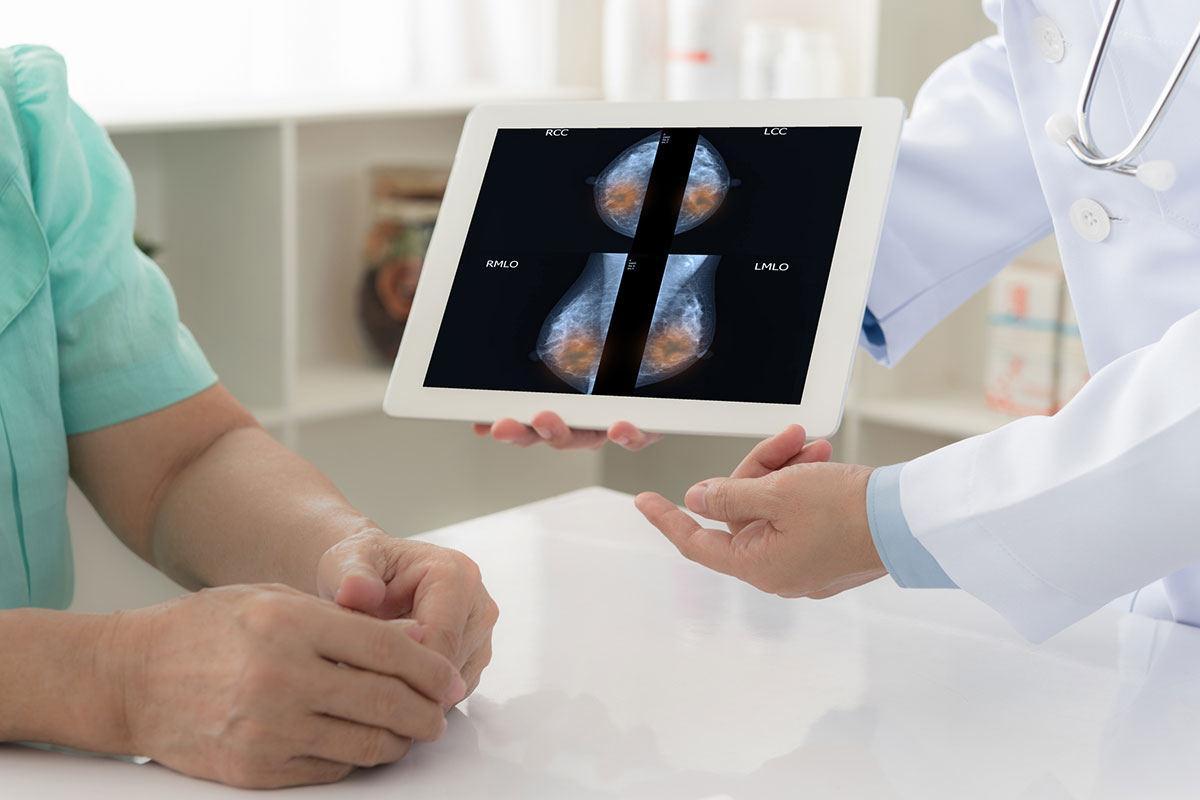<< Back
Mammogram? Let a Women’s Health Coordinator Be Your Guide

October 10, 2019
Whether it’s a woman’s first or the fifth, having a mammogram can bring a flood of emotions and anxiety.
Patients face unfamiliar, sometimes uncomfortable equipment designed to detect abnormalities in the breast. If a mammogram reveals a cause for concern, many women’s minds race as they wait with uncertainty and questions about the next steps.
At the Hartford HealthCare Cancer Institute at The Hospital of Central Connecticut in Plainville and MidState Medical Center in Meriden, patients are never alone in the process. With the help of women’s health coordinators, they are guided every step of the way — from imaging to diagnosis.
Nurse Kim Kerr, the women’s health coordinator at the Cancer Institute in New Britain, can guide a patient through the waters of breast imaging with efficiency, finesse and compassion. She knows that her job is equal parts technical and personal when patients come in for a mammogram.
“You’ve just found out you need a biopsy, don’t know what that means, don’t know how long this process is going to take, don’t know when your doctor’s office is going to call back with the actual results,” she says. “In the process that we’ve developed, the patient meets with the radiologist, the radiologist will discuss the results and recommendations, and then I meet with the patient.
“I will further explain the results and next steps, answering any other questions and allaying any fears. Then I reach out to their referring physician to determine how that physician would like to proceed with scheduling additional testing.”
It’s that relationship with the radiologists and referring physicians that makes the position of women’s health coordinator a unique and integral part of a patient’s mammogram and imaging experience at the cancer institutes at the Hospital of Central Connecticut and MidState.
“We have reimagined the patient experience, creating a seamless experience for women during an anxiety-provoking time,” says Dr. Camelia Lawrence, director of breast surgery at the Hospital of Central Connecticut and MidState. “Most institutions have navigators for women after their diagnosis of cancer, but not during the pre-diagnosis phase.”
The women’s health coordinator is the central piece between radiologist, surgeon, referring physician and patient. By working as a liaison, the women’s health coordinator keeps lines of communication open and patient anxiety at a minimum.
“When a patient receives information, they are already nervous,” says Natalie Pelletier, mammography manager at the Hospital of Central Connecticut and MidState. “Right here, we have a person who can help guide a patient through the process and make phone calls.
“Many times we are familiar with the patient’s physician and we can anticipate how the physician would like to proceed, getting patients set up same day for biopsies and additional imaging. And if patients decide they don’t want this service right now, we’ll be there for them when they are ready and need us.”
By building strong relationships with referring physicians, the women’s health coordinator knows which physicians have provided advance approval for additional imaging, expediting the process. And because radiologists and surgeons are in the same location, all procedures happen under one roof, making the experience very convenient for patients.
“Coordination of care includes retrieval of additional imaging, plus communicating with referring physicians and surgeons, and it’s all done before a diagnosis,” says Kristoffer Popovitch, regional director of the Hartford HealthCare Cancer Institute. “This is a customized patient experience, according to the needs of the individual patient.”
Together with the radiologists, surgeons and scheduling, what happens in concert inside the Cancer Institute with one thing in mind: helping patients get through what can be a very difficult and stressful time while providing expert care with the latest treatment and technology.
“When you see a patient is so happy and they are leaving here relieved, everything we do is with that in mind,” Natalie Pelletier says with a smile.
For more information about The Hospital of Central Connecticut Cancer Institute, click here.